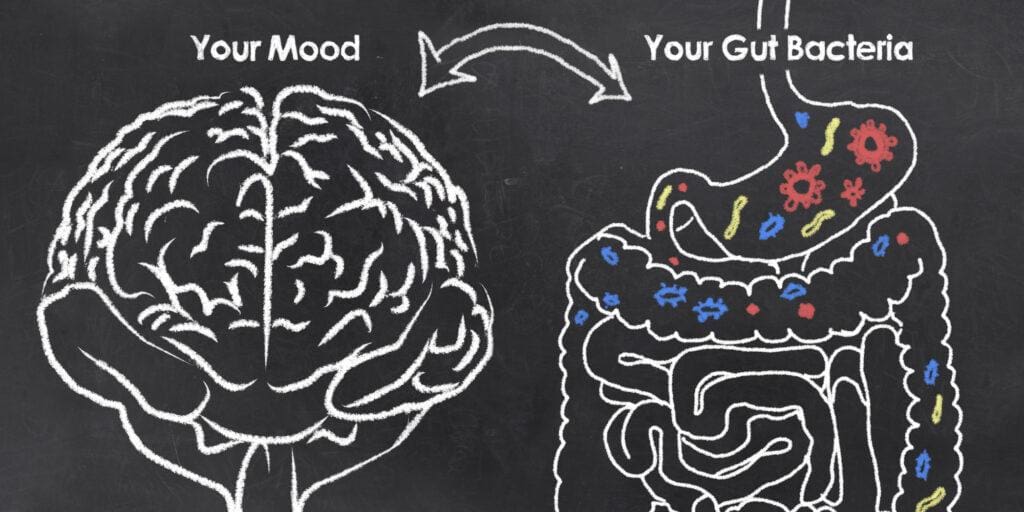Have you ever had butterflies in your stomach when you were scared? Or felt your stomach twist in knots when you were nervous? Believe it or not, there’s some truth to these expressions. Though there are no real knots or butterflies in your stomach, the truth is that the way that you feel emotionally can greatly impact how you feel physically—and vice versa.
Today, we’ll answer some of your most frequently asked questions about gut health and anxiety: how are they related? And what can be done to treat both? Find out more about what is going on between your head and your gut below.
How Are Gut Health and Anxiety Connected?

There are over 100 million nerve cells that allow the gut to communicate with the brain. This is known as the gut-brain axis. The complex highway of nerves that form the gut-brain axis is the root of the relationship between gut health and anxiety. With the gut and the brain in constant contact with one another, they each can have a significant impact on the other.
It’s been long known that when somebody has anxiety, it can affect the stomach. In fact, for many people with anxiety, they can face:
- Stomach aches and cramping
- Nausea
- Diarrhea
- Vomiting
This is because mental health symptoms can actually physiologically change your gut health, specifically the gut flora that helps keep your stomach healthy and functioning. This gut flora and millions of microbiota throughout the gastrointestinal tract keep your immune system functioning as well. Essentially, when your gut is feeling good, you will feel good.
The gut sends signals to the brain and, likewise, the brain sends signals to the gut. So, when somebody has mental health symptoms, it can result in the physical sensations described above. Similarly, when the stomach is upset from an illness, bacteria, or chronic condition, it can cause a lot of mental health distress.
Interestingly, studies show that having an imbalance of microorganisms in the GI tract can cause anxiety. When there is not enough (or even too much) of the good gut flora, it can trigger inflammation in the gut. Not only does this inflammation and gut irritation cause discomfort and pain in the body, but it can also cause mental health symptoms to develop—specifically anxiety and depression.
This is why people with certain health conditions, such as irritable bowel syndrome (IBS), are more prone to having anxiety, depression, and other mental health concerns. The condition itself can cause the gut to send signals to the brain indicating that something isn’t right. In turn, the brain can become distressed.
Additionally, as with any other type of chronic pain can cause, having pain in the gut can lead to anxiety because you might worry about:
- Not being able to keep plans
- Needing to be close to a restroom at all times
- Finding foods that won’t irritate your stomach
- Having continuous pain
When this happens, it starts a vicious cycle. The more anxiety and stress you have, the more problems you will have with the GI tract. Plus, the more inflammation in the GI tract there is, the harder it becomes to regulate your mental health symptoms.
All of this goes to show that gut health and anxiety are intrinsically linked. This means that in order to take care of one, you have to take care of the other. So, let’s move onto the next frequently asked question: how exactly can you treat gut health and anxiety?
How Can You Take Care of Your Physical and Mental Health?

Studies show that people who take the right kind of pre- and probiotics have reduced anxiety symptoms once their gut health is back on track. Overall, people who take these supplements (and therefore have better gut health) are less likely to experience debilitating anxiety. Of course, this isn’t the only thing that somebody can or should do to improve their physical and mental health.
There are other ways to boost your gut’s good health, such as eating a diet that helps to lower inflammation throughout the body. Managing any preexisting health conditions through proper treatment, medication, necessary therapies, and other interventions is also essential in maintaining proper gut health. As a result, you might experience less gastrointestinal distress, which can lead to less anxiety.
On the flip side of this, there are ways to manage anxiety that can help to control discomfort within the gut as well. Some strategies to take care of your mental health include:
- Counseling and psychiatry
- Trying Cognitive behavioral therapy (CBT)
- Having a network of support
- Getting enough physical activity
- Getting enough sleep
These factors and more contribute to one’s overall wellbeing. It’s important to be mindful not just of the gut health and anxiety link but also all of the other ways that one bodily system functions can impact another’s. This is often why co-occurring disorders are so common. The body functions by working together, so when one system is off, it can trigger a domino effect.
Ultimately, this means that in order to keep your gut health, mental health, and overall well being managed, you must work with your care team to have a good plan in place for any symptoms you may be experiencing. When in doubt about what to do next, reach out to people who truly understand what it’s like to have chronic gut conditions in addition to mental health distress.
You can share your story and get connected with others through the Pain Resource Community. Each step you take toward improving your gut health and anxiety will help you to better yourself overall. Share what has worked for you, your health goals, and the ways in which you’ve seen your gut connect to your mind.

